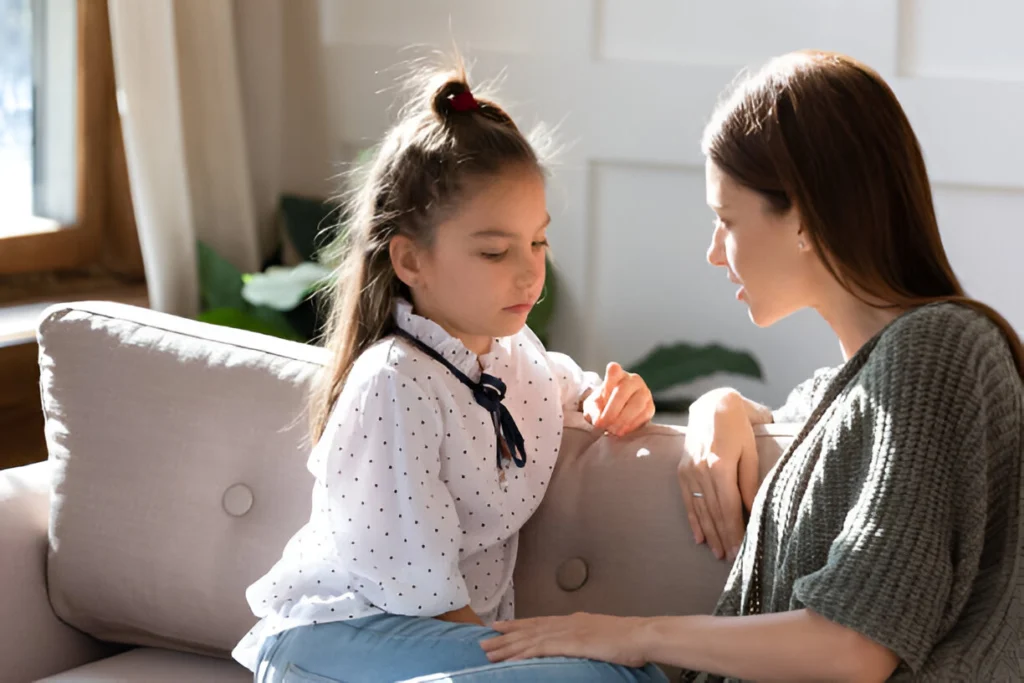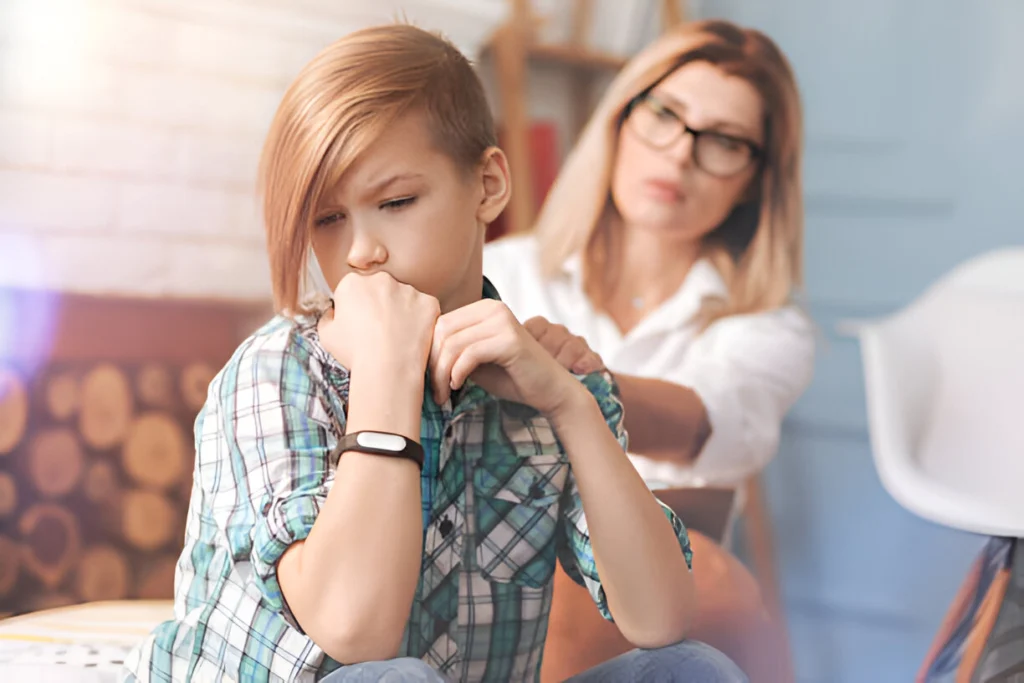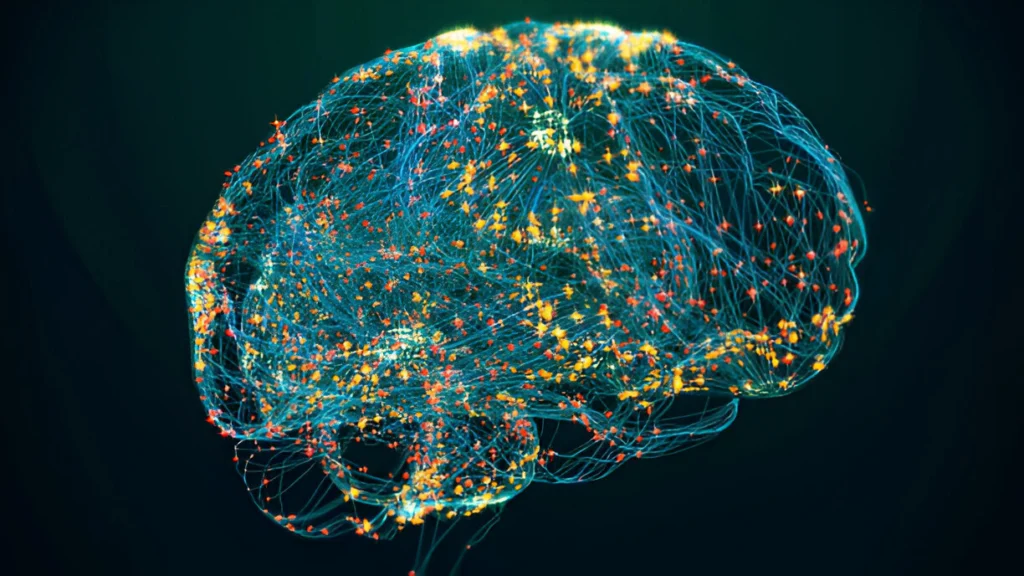Emotional management is essential in parenting, as your emotional state greatly affects your child’s growth. Have you seen how your child reflects your emotions, whether happy or upset? This is called parental modeling, a vital element in teaching your child about emotions and well-being. Parental modeling shines through in what you say and do, and how you handle your feelings.
Picture this: you handle a tough situation calmly and find a solution. Your child watches and learns. They see that dealing with hard emotions is possible1. But, if you often get angry or use bad ways to cope, your child might think that’s okay. This makes it tough for them to manage their feelings well1.
In today’s world, teaching your child how to handle emotions is more important than ever1. Kids look up to their parents for examples. By knowing how to model emotions, you can play three big roles in your child’s emotional health:
Key Takeaways
- Parental modeling is a powerful tool in shaping a child’s emotional intelligence and well-being.
- Children learn how to manage their emotions by observing their parents’ reactions and coping strategies.
- Healthy parental modeling can help children develop effective emotion regulation skills.
- Parental characteristics, such as emotion regulation and mental health, influence the socialization practices children experience.
- Understanding the impact of parental modeling is crucial for fostering emotional resilience in children.
Understanding Emotion Regulation and Its Importance
Emotional regulation is key to emotional intelligence. It’s about managing our feelings inside and out. It’s vital for kids to grow well, make friends, and feel good2.
Definition and Components of Emotion Regulation
It’s about knowing and handling our feelings and others’. We use strategies like changing how we think or feel to manage our emotions. This helps us deal with our feelings in a good way.
Adaptive and Maladaptive Emotion Regulation
Good emotion regulation uses healthy strategies. Bad strategies, like hiding feelings, can harm us. It’s important to use the right ways to handle our emotions.
Learning to manage emotions takes time. Babies start to show feelings like joy and anger. Toddlers and preschoolers get better at feeling and understanding others. As they grow, they learn to handle more complex feelings2.
Good emotion control is key for positive parenting. Parents who control their emotions better can meet their child’s needs. This helps build a strong bond and makes kids feel secure3.
| Emotion Regulation Strategies | Description |
|---|---|
| Cognitive Reappraisal | Reframing a situation to change its emotional impact |
| Attention Deployment | Shifting attention to or away from emotional stimuli |
| Response Modulation | Controlling the expression of emotional reactions |
Knowing about emotion regulation helps parents support their kids’ emotional growth. It’s a way to encourage healthy emotional intelligence.
The Tripartite Model of Family Influence on Emotion Regulation
Emotion regulation is key for managing feelings. It grows in the family setting. The tripartite model says kids learn to manage emotions through three ways: watching, parenting practices, and family mood1.
Observational Learning and Modeling
Children watch their parents closely. They learn from their parents’ emotional behaviors1. This helps kids figure out how to handle their own feelings1.
Emotion-Related Parenting Practices
Parents teach kids about emotions. This includes helping them understand and share their feelings. A supportive family helps kids manage their emotions better1.
Emotional Climate of the Family
The family’s mood affects kids’ emotional skills1. A loving and open family helps kids regulate their emotions well4.
Knowing the tripartite model helps us understand how families influence kids’ emotional growth1.
| Mechanism | Description |
|---|---|
| Observational Learning and Modeling | Children learn emotion regulation strategies by observing and imitating their parents’ emotional behaviors and expressions. |
| Emotion-Related Parenting Practices | Parenting practices that focus on the socialization of emotions, such as teaching children to label and express their feelings, can directly influence a child’s emotion regulation skills. |
| Emotional Climate of the Family | The overall emotional climate within the family, including the quality of the marital relationship and the level of family expressiveness, can shape a child’s ability to regulate their emotions. |
The Role of Parental Modeling in Emotion Regulation

Children learn a lot from their parents when it comes to emotions. Parental modeling is key in teaching kids how to handle their feelings. By watching and copying their parents, kids learn to deal with their own emotions5.
Parents are the first people kids look up to for emotional guidance. When parents show healthy ways to manage emotions, kids are more likely to follow. On the other hand, if parents use unhealthy ways to deal with feelings, kids might pick up those bad habits6.
The role of parents in teaching kids about emotions is huge. Kids who see their parents handle emotions well tend to do the same. This can help kids do better in school, get along with others, and feel happier overall7.
Creating a space where parents show good emotional management helps kids learn too. This early learning helps kids grow into emotionally smart and strong adults.
Parenting Styles and Emotion Regulation
Parenting styles greatly affect how well a child can manage their emotions. Authoritative parenting, which is warm and supportive yet sets clear rules, helps kids feel emotionally secure6. Harsh and controlling parenting, however, can make it hard for kids to handle their feelings, leading to problems.
Authoritative Parenting and Emotional Security
Authoritative parents find a good balance between being responsive and setting limits. This creates a caring space where kids can learn to control their emotions. Such parenting is linked to kids feeling more emotionally secure as they grow up8.
Harsh and Controlling Parenting Styles
Harsh and controlling parenting, marked by too much criticism and punishment, can block a child’s emotional regulation. These methods can lead to bad ways of dealing with feelings and emotional issues68.
How parents act and interact with their kids is key to their emotional growth. By creating a supportive environment, parents help their children develop the emotional skills needed to face life’s hurdles.
“Warm parenting style is conducive to emotion regulation of undergraduate students.”8
The Impact of Parent-Child Relationship Quality
The quality of the parent-child relationship is key in helping a child manage their emotions. When kids feel supported and loved by their parents, they tend to handle their feelings better9.
Emotional Support and Warmth
Children who feel emotionally supported and loved by their parents are more likely to feel secure. This makes them more open to sharing their feelings without fear9. Parents who listen to their kids’ emotions teach them how to manage their feelings effectively9.
On the other hand, kids without emotional support struggle to control their emotions9. They might find it hard to express their feelings, leading to unhealthy ways of coping9. The quality of the parent-child relationship is crucial for a child’s emotional well-being9.
Studies have shown that programs like Attachment and Biobehavioral Catch-up (ABC) and Circle of Security help strengthen the bond between parents and children9. These programs improve attachment and lead to better outcomes for kids9. Programs that help parents understand their children’s feelings, like Minding the Baby, also make for healthier relationships9.
By focusing on a strong parent-child bond, parents can greatly help their kids develop good emotional regulation skills9. This support is essential for a child’s emotional health throughout their life9.
Parental Emotionality and Its Influence
As parents, our emotions greatly affect our kids’ emotional growth. Kids learn from watching and feeling our emotions. Parental emotionality shapes how they handle their feelings and emotions.
About 20% of parents might show kids how to handle emotions badly. This can hurt how kids feel and manage their emotions10. But, research also finds that family, especially parents, is key in teaching kids to control their emotions10.
Studies show that moms react differently to baby’s cries. This shows how important it is for parents to manage their emotions well10.
| Parental Emotionality Factors | Impact on Children |
|---|---|
| Emotional sensitivity, intensity, and persistence | Shapes children’s neural responses to emotional facial expressions, both at full and reduced intensity |
| Parental characteristics (e.g., warmth, support, negative affect) | Influences brain activity in adolescents and school-aged children during emotional face perception |
| Emotion-related behaviors (e.g., anxiety, depression, abuse, neglect) | Impacts infants’ neural responses to emotional faces |
Being able to understand our and others’ thoughts and feelings is key. It helps us deal with emotions and interact better with others10.
Knowing how parental emotionality affects us helps us teach our kids better. We can show them how to handle emotions in a healthy way. This helps them grow strong in emotion regulation and feel their emotions better.
Parental Modeling in Emotional Management
As parents, we have a big impact on our kids’ emotional growth. Parental modeling is key in teaching our kids to handle their feelings well. By showing them how to manage emotions, we help them develop skills that last a lifetime.
Studies show that kids who feel secure with their parents do better with emotions as toddlers11. Showing them how to handle emotions is a great way for them to learn11. It’s important for parents to have more positive interactions than negative ones to encourage good behavior11.
But, harsh parenting can lead to aggressive behavior in kids11. The good news is that most kids learn to deal with big feelings by elementary school11.
By being mindful of our own emotions and how we handle them, we can be great role models for our kids. We teach them skills that will help them in many ways as they grow up.
The Role of Child Characteristics
Parents play a big role in helping their kids manage their feelings. It’s important to know how a child’s unique traits can affect this process5. Kids who can control their emotions do better with friends. They also tend to have fewer problems in preschool5.
Also, kids who struggle with emotions might gain weight too fast and become obese5.
Temperament and Negative Emotionality
A child’s natural behavior style, or temperament, is key in managing feelings. Kids with a tough or negative emotionality need extra help from parents12. They might be more aggressive and emotional, especially between 4 and 6 years old12.
The Morris triple model shows how family, social, and emotional factors affect a child’s well-being12. Knowing their child’s unique traits helps parents support their emotional growth better.
| Characteristic | Impact on Emotion Regulation |
|---|---|
| Negative Emotionality | Increased risk of poor emotion regulation and externalizing behaviors5 |
| Difficult Temperament | Requires more targeted parental support and guidance in emotion management5 |
Understanding child characteristics helps parents support their kids’ emotional growth. This way, they can develop healthy emotional skills.
Emotion Regulation in Adolescence

As children grow into teenagers, how they manage their feelings changes a lot. This is a key time for parents to help their teens learn to control their emotions. Friends also play a big part in how teens feel and handle their feelings.
Studies show that how parents act affects their teens’ ability to manage emotions13. If a mom is distant, her teen might feel more angry or sad. But, if a dad is strict, his teen might feel less sad. This shows how important each parent is in their teen’s emotional health.
The bond between a parent and child is also very important14. When parents are loving, their teens feel better and use better ways to handle their feelings. This means they don’t just bottle up their emotions.
As teens get older, they often use less effective ways to deal with their feelings14. This can lead to more problems. It’s important for parents to know this and help their teens find better ways to handle their emotions.
It’s key to understand how parents, emotions, and growing up are connected. This helps support teens in developing healthy emotional habits during this important time.
The Interplay of Parent and Child Factors
Developing a child’s ability to manage emotions is a complex process. It involves the interaction between parents and children15. Parents’ emotional control, how they parent, and the family’s emotional atmosphere greatly affect a child’s emotional skills. At the same time, a child’s natural temperament and emotional traits influence how parents react and interact with them.
Studies reveal that parents who struggle with emotions tend to parent less supportively. This can lead to behavioral issues in their kids16. However, parents who manage their emotions well and create a caring environment help their children develop emotional strength and well-being.
| Parent Factors | Child Factors |
|---|---|
| Emotion regulation abilities | Temperament and negative emotionality |
| Parenting practices (e.g., emotional support, harsh discipline) | Capacity for emotion regulation |
| Emotional climate of the family | Behavioral and emotional outcomes |
The interaction between parents and children is key in shaping a child’s emotional growth and happiness15. Long-term studies are vital to understand how these factors influence each other16. By grasping this complex relationship, we can help families create a healthy emotional space. This supports children in developing good emotional regulation skills.
Neural Correlates of Emotion Regulation

Research is uncovering the complex brain processes behind emotion control and how parents play a key role. Recent studies have looked into the biological and neurological aspects of emotion control. They show how family environments shape these brain circuits.
Impact of Parenting on Neural Circuitry
A study from the Adolescent Brain Cognitive Development℠ (ABCD) study focused on emotion regulation in late middle childhood. It found that having more close friends boosts brain activity in areas like the fusiform gyrus and insula during emotion tasks17. On the other hand, social challenges and discrimination lower activity in these areas17.
This research highlights the big impact of social experiences on the brain’s emotion control systems17. Knowing how family dynamics affect the brain helps in supporting children’s emotional growth.
| Neural Correlates of Emotion Regulation | Association with Positive Social Experiences | Association with Negative Social Experiences |
|---|---|---|
| Fusiform gyrus, insula, temporoparietal junction, inferior parietal lobe, superior temporal gyrus | Increased activation during implicit emotion regulation tasks | Decreased activation during implicit emotion regulation tasks |
| Fusiform gyrus | – | Decreased activation during implicit emotion regulation tasks |
| Middle temporal gyrus | – | Decreased activation during implicit emotion regulation tasks |
Another study looked at the brain’s response to emotions in teens with suicidal thoughts18. It found that these teens used different brain areas when faced with emotional stimuli18. They also struggled with tasks that require emotional control18.
This study shows the critical role of understanding emotion regulation in the brain. It also highlights how family and parenting affect this skill. By studying these neural processes, we can develop better ways to help kids and teens manage their emotions.
Implications for Prevention and Intervention
Understanding how parents model emotions is key to helping families. It helps in creating strategies to support families and help children develop emotionally19. Studies show that teaching parents to be more flexible can greatly improve their emotional control and parenting skills19. This, in turn, helps children regulate their emotions better and improves family dynamics.
Authoritarian and neglectful parenting can lead to behavioral issues in kids. This shows how important a parent’s approach is in shaping a child’s behavior.
Knowing the impact of parental modeling helps in creating better support programs. These programs empower parents to manage their emotions better19. Interventions like Acceptance and Commitment Therapy (ACT) have shown to positively affect children with various issues.
Training parents in mindfulness can reduce aggressive behaviors in children with Autism Spectrum Disorder. This shows the effectiveness of such interventions.
Interventions that improve parental emotional control can greatly benefit children. They help in reducing stress in parents and enhancing children’s emotional regulation19. ACT-based strategies have been effective in improving parenting stress and emotional regulation in parents of children with Oppositional Defiant Disorder.
Understanding the parent-child relationship is crucial. Programs can help parents see how their emotional styles affect their children and family dynamics19. Positive parental responses to children’s emotions can improve their emotional regulation, while negative responses can lead to psychological issues.
In summary, research on parental modeling and emotion regulation is vital. It helps in creating effective prevention and intervention strategies20. A review of 33 studies found positive effects on parents’ mental health and parenting skills. This highlights the need for targeted interventions to support children’s emotional development.
Future Directions in Research

Research on how parents model emotions for their kids is growing. There are many new areas to explore21. Long-term studies are needed to see how this affects kids’ emotions and how it lasts21. Also, studying different cultures can help us understand if this is a global or local issue21.
Using brain science to study this topic could reveal a lot21. It could show how parenting shapes the brain’s emotional centers. This could help us find out what makes some kids better at handling emotions21.
It’s also important to look at how kids’ personalities affect how well they learn from their parents21. Knowing this can help us create better ways to help kids manage their feelings21.
By exploring these areas, we can learn more about the link between parental modeling, emotion regulation, and emotional development21. This knowledge can help us make better programs and policies for families. It will support the emotional health of kids and teens21.
Conclusion
The power of parental modeling is huge for your child’s emotional growth. By showing healthy ways to feel and handle problems, you greatly influence your child’s emotional intelligence. This sets them up for success in life22.
Supportive behaviors and a caring emotional environment are key. Your emotional control and example are vital for your child’s mental health. They help your child deal with life’s challenges23. Taking care of your emotions and showing positive ways to manage feelings helps your child grow strong and confident24.
As a parent, your role in teaching emotion regulation, emotional intelligence, and child development is huge. By taking this role seriously, you help your child reach their full potential. Your influence will be a lasting gift to your child.
Source Links
- The Role of the Family Context in the Development of Emotion Regulation
- Importance of Teaching Children Emotional Regulation –
- Emotion Regulation in Parenthood – PMC
- Family and parenting factors are associated with emotion regulation neural function in early adolescent girls with elevated internalizing symptoms – European Child & Adolescent Psychiatry
- Parental Influences on Children’s Self-Regulation of Energy Intake: Insights from Developmental Literature on Emotion Regulation
- Parental Emotion Regulation Strategies and Parenting Quality Predict Child Internalizing Symptoms in Families Experiencing Homelessness
- Parental Emotion Regulation: The Role of Parents’ Own Childhood Maltreatment (Chapter 4) – Emotion Regulation and Parenting
- Frontiers | The impact of parenting styles on undergraduate students’ emotion regulation: The mediating role of academic-social student-faculty interaction
- Parenting and Child Development: A Relational Health Perspective
- Associations Between Emotion Regulation and Parental Reflective Functioning
- How to help kids understand and manage their emotions
- Frontiers | Parenting style and children emotion management skills among Chinese children aged 3–6: the chain mediation effect of self-control and peer interactions
- Negative Parenting, Adolescents’ Emotion Regulation, Self-Efficacy in Emotion Regulation, and Psychological Adjustment
- Parental warmth, adolescent emotion regulation, and adolescents’ mental health during the COVID-19 pandemic
- The Child and Parent Emotion Study: protocol for a longitudinal study of parent emotion socialisation and child socioemotional development
- A Parent’s Affect on Their Child’s Mental Health
- Associations between social behaviors and experiences with neural correlates of implicit emotion regulation in middle childhood
- Neural correlates of automatic emotion regulation and their association with suicidal ideation in adolescents during the first 90-days of residential care – Translational Psychiatry
- Parenting Intervention for Psychological Flexibility and Emotion Regulation: Clinical Protocol and an Evidence-Based Case Study
- Effects of emotionally oriented parental interventions: a systematic review and meta-analysis
- Findings, Issues, and New Directions for Research on Emotion Socialization
- Current Themes in Understanding Children’s Emotion Regulation as Developing from within the Parent-Child Relationship
- Frontiers | Parental Emotion Socialization and Child Psychological Adjustment among Chinese Urban Families: Mediation through Child Emotion Regulation and Moderation through Dyadic Collaboration
- Emotional Regulation in Children: A Parent’s Guide to Helping






Trackbacks/Pingbacks